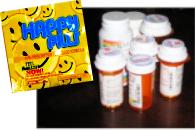

Technology from neuroscience enables us to more easily study the routine functions of the living brain. We have also discovered much about the biochemical baths in which all nerve cells are awash. A concurrent revolution has accelerated the marketing of psychiatric medications. Not only are more pharmaceutical products released to consumers than ever before; the pharmaceutical industry has also rapidly expanded the means to sell their wares. Of course, such enterprise is promoted as benign service to the public: people who suffer are now more aware that relief is available. What penalties could possibly arise from such advances?
There certainly are psychiatric medicines that are valuable remedies for individuals whose bodies cannot produce optimal amounts of required bio-chemicals. I do recommend that people in my clinical care seek out these aids, when indicated. Some folks cannot live a normal and satisfying life without medical help. This is no different from a diabetic who relies on insulin, or a person with hypothyroidism taking thyroxin. However, not every emotional upset attributed to a chemical imbalance is in fact caused by any structural brain impairment or inherited defect. To mislead the population into thinking that all emotional upsets are disorders to be fixed by drugs is a public health scandal. To assert that all mental disorders are biologically rooted is bad science.
There are reasons that we produce emotions. The fact that we sometimes feel with intensity out-of-proportion to the occasion does not mean emotions themselves are invalid, nor a problem. Displays of emotion that shake up the social order are not always ill-advised. Emotions that are uncomfortable are not best avoided, nor ignored. Although chronic emotional tension can be a threat to physical health, the flexible ebb and flow of pleasant and painful emotions is integral to healthy living. What does it cost to mask, regulate, and attenuate emotions via pharmaceutical interventions?
In order to understand the downside of medically regulating emotions, we must consider what purpose emotions serve. There are generally two functions of emotion that I divide into social functions and personal functions:
1) Emotional displays are an important social device that contributes to the survival of the species. People can avoid damaging conflicts and join in on cooperative efforts by recognizing the dispositions of others around them. Showing what you feel allows others to make choices about the impact of their behaviors on your life. 2) The private experience of emotions is a personal prod or lure towards effective behaviors, while we navigate chaotic encounters with the world around us. By quickly summarizing the aggregate lessons of our past experience, emotions enable us to make decisions more quickly than if we were required to think through all of our history and the conclusions we drew. In the constant stream of change that is the cosmos, life is decision-making activity. Emotions are a crucial personal guide to successful decisions that serve our own value systems.
Consequently, medications that blunt emotions prevent others from adapting appropriately to our priorities in life and rob us of an important tool for making choices. This does not mean that all emotions are helpful or welcome. It simply means that emotions survived human evolution because they serve purposes that we do well to discern and accept. Even if my personal biology exacerbates or impairs my emotional integrity, I must still recognize those emotions that serve a purpose and learn to use them to enhance my quality of life.
When afraid, I may really face danger. When angry, there may be just cause. When sad, I may have suffered significant loss that my tears honor. When guilty, I may have done wrong. When anxious with no apparent occasion, I may be avoiding something that deserves my concern. When depressed in the absence of obvious burden, I may be assuming a hopeless or powerless stance that deserves redressing. When consumed by unrelenting rage, I may benefit from reevaluation of my judgments. When crushed with shame, I may best thrive by reassessing my own worth. When emotions are masked, distorted or blunted by pharmaceuticals, none of these important options command attention. The status quo may remain unchallenged when change is the preferred course.
Lives squandered by medically-induced tolerance for bad situations and unexamined histories are not necessarily a beneficial outcome for individuals, nor for society as a whole. The pernicious fiction that upsets are best managed by mitigating struggles and strife via pharmaceuticals constitutes a blight on our overmedicated culture. Family doctors, psychiatrists, well-meaning friends and others who care are often too willing to support such solutions. Drug abuse is merely the unsupervised practice of the same incomplete solution. Acknowledging emotions, understanding their presence and their functions, and relying on one's bodily wisdom to suggest direction or to prompt changed patterns of living, more often lead to permanent and growing advantages in life.
